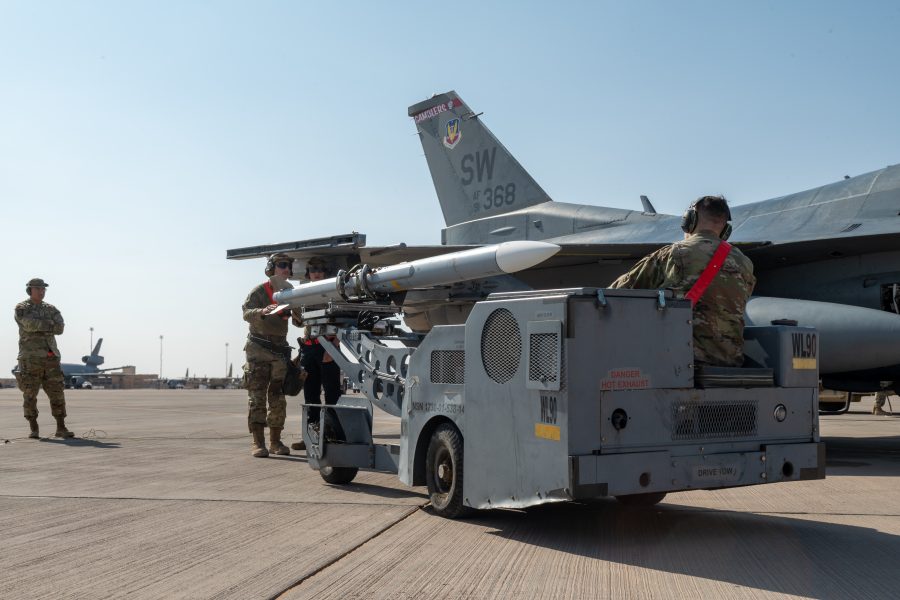RTX, maker of the Patriot, AMRAAM, Sidewinder, Javelin, Stinger, and other missiles featuring significantly in the war in Ukraine—and in the defense preparations of neighboring NATO countries—has logged about $2 billion in replenishment orders as a result of the conflict and expects to top that figure in the coming year, chief executive officer Greg Hayes said in a July 25 earnings call.
Separately, President Joe Biden’s administration on July 25 announced yet another drawdown of weapons from U.S. stocks to be provided to Ukraine worth $400 million, including many of those same systems Hayes referenced.
Hayes said the company—until recently known as Raytheon Technologies—is “so bullish” on defense systems sales “for the next couple of years” because it has logged large orders for AIM-120 AMRAAM and other missiles, and that all 18 countries using the Patriot air defense system are or will be ordering new Guidance Enhanced Missile-Tactical (GEM-T) rounds for their Patriot launchers.
“We have orders coming from NATO,” he said. “I think in the back half of the year … we’re planning on significant order intake on both AMRAAM and GEM-T, as well as, of course, Excalibur,” which is a guided, extended-range artillery shell. “We got the Javelin order [and] we had the Stinger order already,” Hayes noted. “Those orders will continue to grow.”
“Right now, we still have only seen $2 billion of orders associated specifically with Ukraine replenishment,” Hayes said. “We think there’s probably another $2.5 billion coming in the next 12 months, associated with just the Ukraine replenishment, on top of the GEM-Ts.”
AMRAAM sales through the Air Force channel of the Foreign Military Sales program have been $1.2 billion this year so far, with German and Ukrainian orders in that package, Hayes noted.
Company officials also pointed to $265 million in orders for the Javelin anti-tank missile and $251 million in orders for the AIM-9X Sidewinder dogfight missile.
Chief financial officer Neil Mitchell said Raytheon booked $1.1 billion in classified awards in the second quarter but also reported “headwinds” on several classified programs amounting to “$40-$50 million” in the Raytheon Intelligence and Space business, “and that happened just as we closed out the quarter.” He could not describe the affected programs, but said they are “in the test phase” and that the company is “learning through that phase,” which has “a bit longer to go.”
Hayes, meanwhile, noted that the House and Senate were supportive of major RTX programs while marking up the 2024 National Defense Authorization Act, including hypersonics, the nuclear Long-Range Stand-Off missile, and the Pratt & Whitney unit’s F135 engine upgrades.
Secretary of State Anthony Blinken, in announcing the latest defense assistance to Ukraine, said the package includes “air defense munitions, artillery rounds, armored vehicles, and anti-armor capabilities, as well as other equipment essential to strengthening Ukraine’s brave forces on the battlefield, helping them retake Ukraine’s sovereign territory, and defend their fellow citizens.”
According to the Pentagon, the lasts package specifically includes:
- Additional munitions for Patriot air defense systems and National Advanced Surface-to-Air Missile Systems (NASAMS)
- Stinger anti-aircraft systems
- Additional ammunition for High Mobility Artillery Rocket Systems (HIMARS)
- 155mm and 105mm artillery rounds
- 120mm and 60mm mortar rounds
- 32 Stryker Armored Personnel Carriers
- Tube-Launched, Optically-Tracked, Wire-Guided (TOW) missiles
- Javelin and other anti-armor systems and rockets
- Hornet Unmanned Aerial Systems
- Hydra-70 aircraft rockets
- Tactical air navigation systems
- Demolitions munitions for obstacle clearing
- Over 28 million rounds of small arms ammunition and grenades
- Night vision devices and thermal imagery systems
- Spare parts, training munitions, and other field equipment
Pentagon spokesperson Sabrina Singh said the military services are fully consulted on what is provided in these “excess” materiel packages provided to Ukraine and can “weigh in on what they have available on their shelves.” The U.S. will always “maintain a level of our readiness, while also being able to support Ukraine” and will “continue to assess what we can flow to them without dropping below our own readiness level.”
